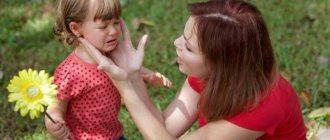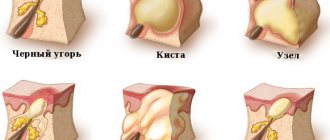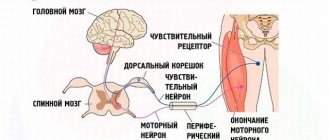Possible reasons
Health problems can affect the appearance of restless sleep in a child.
Restless sleep can occur in both a one-year-old child and infants. It is important to know what can provoke the occurrence of this phenomenon. We will look at the most common options.
- Difficulty breathing. For example, in a situation where the baby has a stuffy nose or there is very dry air in the room where the child sleeps, which causes crusts to appear in the nasal passages.
- The presence of infectious diseases of the nasopharynx.
- Lack of vitamin D3. In addition to restless sleep, the presence of wet feet and palms may also be noted.
- Lactase deficiency in the baby’s body, manifested by bloating, regurgitation, and night colic.
- Presence of an allergic reaction.
- A congenital anomaly manifested by the presence of a narrow nasal passage.
- The result of reflex reactions. At 6 months, a baby has a desire to sit, walk, and even in a dream, the child’s brain can send commands to the muscular system, as a result of which twitching of an arm or leg will be observed.
- Presence of the first Moro phase. There is a throwing up of the arms when changing position or a sharp sound, and the baby may wake up and cry.
- Presence of gastroesophageal reflux.
- Lack of proper drinking regimen.
- The presence of somatic diseases, in particular acute respiratory illnesses, dermatitis, viral infections.
- A restless night's rest may be due to teething.
- The result of the presence of increased intracranial pressure.
- In babies from three to five months, intestinal colic, caused by intestinal microflora that has not yet fully formed, is often the cause of restless sleep.
- Restless sleep may indicate the presence of rickets, encephalopathy, or a brain tumor.
- Hunger is another reason to worry at night.
- The lack of optimal temperature and humidity in the room where the baby sleeps can affect the occurrence of anxiety. The child may be simply hot or cold, or uncomfortable if the air is too humid or dry.
- Having uncomfortable clothes, a bed, or an overfilled diaper can also cause nighttime restlessness.
- Emotional overexcitation can provoke anxiety in sleep.
A restless night's sleep may be due to the onset of the disease. Even when the appearance of the baby cannot yet suspect an illness, internally the child already feels unwell.
What problems deserve attention?
There are problems of a more serious nature. Therefore, you should immediately contact a neurologist if sleep disorders in children/adolescents are as follows:
- Enuresis (especially if children are over 4 years old and teenagers);
- Walking, talking in sleep;
- Nightmares and night terrors.
The above points relate to paroxysmal sleep disorders. Such forms of violations occur very often. Paroxysmal phenomena of more complex forms are convulsions, teeth grinding, nocturnal asthma, nosebleeds, and nocturnal vomiting.
Sleepwalking (somnambulism) – occurs in every fifth child, mainly from birth to 3 years. This disorder is accompanied by slurred speech and sitting on the bed with open eyes. At such moments, the child does not understand what he is doing. In complex forms, this develops into sleepwalking. It is very difficult to wake up a sleepwalker; he should be carefully escorted to bed.
In all seriousness, if you are affected by paroxysmal problems, do not panic, provide your child with safety so that he does not fall, hit, or run away, and wait until the attack passes. Most likely, the baby will not remember in the morning what happened to him.
Dream talking often occurs in mentally healthy children. Most likely, this is simply a manifestation of anxiety.
Bruxism is attacks of teeth grinding at night. They occur periodically, and are often accompanied (already in the morning) by pain in the jaw. During an examination, it is not always possible to notice any damage, but this is dangerous due to many unpleasant consequences - abrasion of enamel, caries, etc.
Startles while falling asleep are sudden and short-lived. Accompanied by contraction of the muscles of the arms, legs and head. At this time, the child experiences an illusion as if he is falling.
Alarming symptoms
Frequent awakenings accompanied by intense crying are a reason to consult a doctor
Parents should be alert if their baby:
- shudders more than 10 times during the night;
- wakes up very often;
- if frequent awakening is accompanied by screaming or strong crying;
- the child’s condition is accompanied by elevated body temperature;
- the child shudders while awake, even in the presence of absolute silence.
Sleep norm: how much sleep should children sleep?
1. Up to 2.5 months. The child sleeps poorly and erratically. At night I often don’t mind having a snack. 2. Up to 4 months. Sleep returns to normal and routine begins to improve. It's time to get used to rituals. 3. Up to 8 months. At night, such children cry less, can fall asleep with a toy, and sleep is more restful. 4. Up to 11 months. During this period, the child does not sleep well at night without his mother, and often wakes up to check on her nearby. Say something to him. Your voice will soothe and help the baby fall asleep. 5. Up to 16 months. The baby becomes more independent. This is the ideal time to train yourself to fall asleep on your own. 6. Up to 21 months. The first vulnerability and uncertainty appears. Don't be too demanding and let him sleep with you sometimes. 7. Over 21 months. The baby begins to come running to the bed, asking for a toy or water. Be persistent but kind to him.
These tips will help you understand the physiology of children's sleep and learn to act according to the baby's age. Now the process of falling asleep will not be so difficult.
Possible consequences
Restless sleep may affect a child's developmental problems
It is important to understand that the presence of restless sleep leads to the fact that the child’s body cannot rest, does not have time to recover, and is filled with energy.
- If you do not pay attention to the situation with restless sleep and do nothing, then undesirable consequences may occur. First of all, sleep problems will affect the child’s nervous system.
- This will be followed by a hormonal imbalance, which, in turn, will affect intellectual and physical development.
- It is possible to develop abnormalities in the functioning of the cardiovascular system.
- Restless sleep can lead to excessive excitability during the day or excessive passivity.
- A child who was unable to rest properly feels tired. He becomes capricious, begins to cry often, and may refuse to eat.
- In the presence of somatic diseases that remain without timely diagnosis, a transition to a chronic form is possible. The development of serious complications is also possible.
It is important that parents consult a doctor if they are concerned about their baby's restless sleep. It is worth remembering that this phenomenon may be a symptom of the presence of a disease. The sooner the diagnosis is made, the sooner treatment will be prescribed, and undesirable consequences will be avoided.
What to do if your child walks at night?
There is a lot of advice on this matter, most often useless. For some parents, the baby wakes up at night, laughs and plays, and is impossible to put to sleep. For others, he wanders around in his sleep, commits unconscious actions that he does not completely remember in the morning.
In the first case, a change in the daytime routine, the development of an associative process of transition to sleep, and sometimes sedative herbal preparations are required.
In the second case, it is better to consult a pediatrician. Somnambulism is the result of the traumatic effect of some factor on the fragile child’s psyche.
If parents cannot independently find out the cause and begin to eliminate it, it is better to seek professional help.
Adviсe
- Ensure that there is an optimal air temperature in the room where the child sleeps (around 18 - 20 degrees), also take care of the optimal humidity (50 - 70%).
- You need to avoid active pastime in the evening. Try to keep your child busy with calm games a few hours before bedtime.
- It is important to take evening walks, as fresh air has a beneficial effect on the child’s body and helps him fall asleep faster.
- Great importance should be paid to the mattress and pillow on which the little one sleeps, as well as the material from which the baby’s bedding and clothes are made.
- Before putting your baby to bed, be sure to put on a new diaper. Don't forget to feed and drink your child before bedtime.
- Teach your little one to certain rituals, for example, reading a fairy tale before bed.
- Carry out water procedures before going to bed. You can add decoctions of sedative herbs to the bath, for example, motherwort, valerian, mint.
- If you suspect a pathology that affects the appearance of restless sleep, immediately seek help from a pediatrician. The specialist will identify the cause and prescribe treatment, if necessary.
Now you know what the causes of restless sleep in an infant may be. It is important to understand that in many cases, sleep anxiety is caused by health problems, which is why it is important to report any symptoms to your family doctor. Remember that untimely initiation of treatment can lead to undesirable consequences.
Prevention of sleep disorders in children
Parents should prevent sleep disorders from an early age, since problems with sleep disorders are often found in adolescents and affect memory, intelligence, attention, and performance. According to statistics, due to poor quality sleep among teenagers, they often fall asleep while driving.
Put your child to bed at the same time every time, avoid loud music, try not to overuse TV watching and emotional stress. Air baths, dousing and rubbing, walks, massage, and sports help children, adolescents and adults fall asleep well.
Read more here
Two years is a special age
A two-year-old child is already a fairly independent person with many useful skills. As he grows up, he gradually becomes accustomed to a certain daily routine. Provided that there are no factors near the baby that cause anxiety during night sleep, he can sleep soundly and not wake up even once.
It is at this time that the character of a little person is formed. He begins the period of entering adolescence, which is accompanied by many significant changes in behavior. The child gets acquainted with a new system of relationships, with the outside world.
An unpleasant moment in the development of personality, the formation of one’s own “I” are the hysterics that the baby throws with or without any reason. Children at this age protest against any infringement of their rights. It is important for parents not to miss this moment in upbringing and try to gently familiarize the child with the boundaries of what is permitted. When he enters the crisis of two years of age, he especially needs parental love and support.












